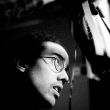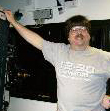|
|
This topic comprises 2 pages: 1 2
|
|
Author
|
Topic: What causes DTS to drop out at reel splices?
|
Mark J. Marshall
Film God

Posts: 3188
From: New Castle, DE, USA
Registered: Aug 2002
|
 posted 12-18-2002 12:56 PM
posted 12-18-2002 12:56 PM



OK, as I understand it, the DTS should keep playing for a number of seconds if it looses track of where it is. Which means it should continue through a splice with no problems because presumably, even if the spliced frame is somewhat screwed up, the very next one should be fine, and things should continue normally. However, every once in a while, our DTS drops on certain reel splices. What would make the DTS just STOP playing sound immediately on a splice? I have a theory of what might be happening, but I wanted to throw it out to the group first. Thanks!
Mark
| IP: Logged
|
|
|
|
|
|
|
|
|
|
|
|
|
|
|
|
|
|
|
|
|
|
John Hawkinson
Film God

Posts: 2273
From: Cambridge, MA, USA
Registered: Feb 2002
|
 posted 12-18-2002 08:58 PM
posted 12-18-2002 08:58 PM




Steve,
I thought that SRD had sufficient redundancy to freewheel in the absence of 2 frames. I'm not sure how I reached that conclusion, though, so perhaps it is inaccurate (it would explain a lot; see below, looks like it is inaccurate). Certainly there should be some distance it should have sufficient redundancy to freewheel in the presence of (perhaps it's only a few perfs?).
I had forgotten about the technique of sending the reel change data in the background earlier; indeed, if it's done on all prints, that should also elminate the problem (yet the problem is still noticable).
Since SRD is 6 frames ahead of the analog soundtrack, it seems like maximal redundancy could be acheived by interleaving/spreading a given frame's sound data across up to 6 frames (and if you were going to ignore basement readers, which you can't, you could spread it a lot further). I know that SRD does some interleaving, though I'm not clear on whether that is interleaving between perfs, or interleaving of "fixels" within a perf, or both.
In any case, the input to the Error Correction stage is 722 8-bit words (76^2 fixels or bits) in 10.4ms (24fps*4), and the output (input to AC3) is 256 8-bit words in 10ms. Naively, I would think that would mean you could lose 1/3 of your frames (256/722 is .35) and still survive, and 1/3rd of 6 frames is 2, i.e. what you might expect around a reel splice.
Thinking about it some more, two other issues come to mind:
a) SRD could crossfade/interpolate between the last data before the gap and the first data after the gap, for sufficiently small gaps. This would seem comparable to what DTS does across changeovers. I guess this could sound really bad if it happened a lot, or if the gaps were too large, but presumably there would be hysteresis in the process.
b) There's going to be some loss of the redundancy from the missing 2 ID frames, so if the 2 frames around the splice are obscured/shifted or otherwise unreadable, then SRD will see 1 good frame followed by 2 unreadable frames with 2 frames not there, and then another good frame. I guess that means 2 in 6, which is not so good.
Digging around in the DA20 manual, I finally came across, "Should the digital data be corrupted through through perforation damge, concealment techniques will be applied for up to 4 perforations (40ms), after which time the DA20 will revert to passing analog audio. Corrected digital data mus tremain valid for a period of time before switching back to the digital track."
I guess this leads to the question, "how much SRD data is usually lost on a splice, and why?" Is it due to the splice being jumpy or the film being offset from the true position, such that the CCD can't read the SRD track? Or is it because the SRD track is out of focus due to the splicing tape? I suppose the latter argues for 4-perf (or less) splicing tape...
--jhawk
| IP: Logged
|
|
|
|
|
|
|
|
|
|
All times are Central (GMT -6:00)
|
This topic comprises 2 pages: 1 2
|
Powered by Infopop Corporation
UBB.classicTM
6.3.1.2
The Film-Tech Forums are designed for various members related to the cinema industry to express their opinions, viewpoints and testimonials on various products, services and events based upon speculation, personal knowledge and factual information through use, therefore all views represented here allow no liability upon the publishers of this web site and the owners of said views assume no liability for any ill will resulting from these postings. The posts made here are for educational as well as entertainment purposes and as such anyone viewing this portion of the website must accept these views as statements of the author of that opinion
and agrees to release the authors from any and all liability.
|

 Home
Home
 Products
Products
 Store
Store
 Forum
Forum
 Warehouse
Warehouse
 Contact Us
Contact Us




 Printer-friendly view of this topic
Printer-friendly view of this topic



















